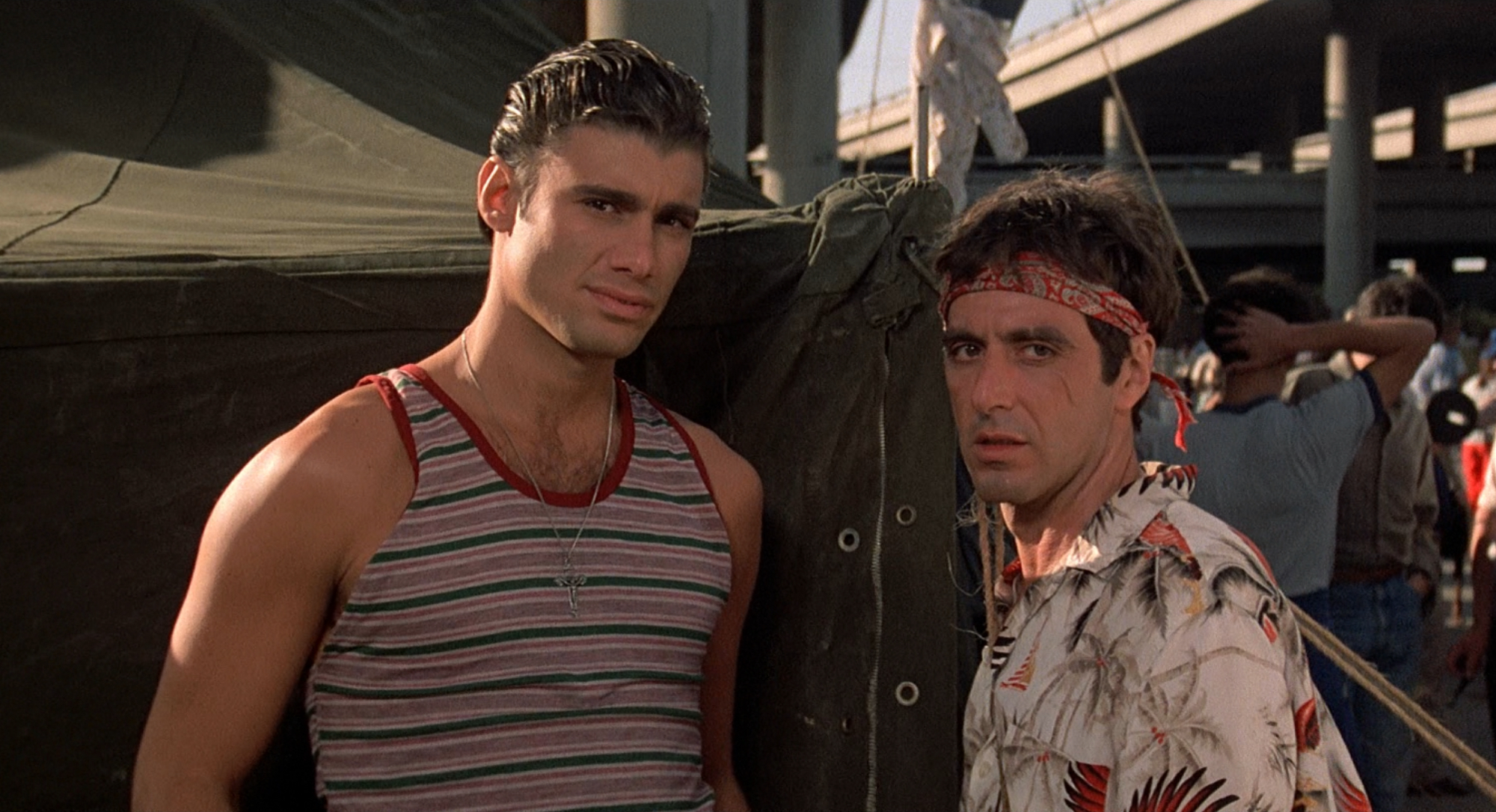In 2011, Nike released the Air Zoom LeBron 9.
Two versions of the high-top sneaker were made, reflecting the color palette of the team for which LeBron played at the time—the Miami Heat. One was a black shoe with red-and-white accents, but it was the other, a white shoe with black-and-red accents, that was named after Miami’s most well-known onscreen anti-hero: Tony Montana, the Marielito cocaine kingpin yayed to the gills and played to 11 by Al Pacino in Scarface.
The tongue on the white version of the LeBron 9 ‘Scarface’ was split evenly on a diagonal line—black on one side, white on the other—with LeBron’s signature embroidered in red. It clearly evoked the iconic one-sheet poster for Scarface, which sees a black and white graphic of Pacino standing in solitude with a handgun at his side; the words “Al Pacino” and “Scarface” line the top border in red lettering.
But the shoe, which can fetch a couple hundred dollars online, isn’t the only link between LeBron and what is arguably director Brian De Palma’s most controversial film…
Both Miami icons eventually ended up in L.A.
Released on December 9, 1983, and penned by Oliver Stone, Scarface takes elements from the 1932 Howard Hawks gangster film of the same name and frames them within the context of the 1980 Mariel boat-lift.
Immediately after arriving in Miami from Cuba, Tony, a small-time hoodlum, begins a relentless power grab and quickly ascends to become a formidable Miami drug lord with an overly excessive, cocaine-fueled lifestyle.
The film’s producers had intended to shoot almost all of Scarface in Miami.
“I was the first guy [from the production] in Miami, and I was supposed to set up the entire movie there,” says Scarface executive producer Louis Stroller.
But some Miami columnists and politicians were highly critical of the storyline, and the controversies surrounding the filming of Scarface garnered numerous headlines before production started.
“Miami was and still is very well-to-do, and there were a lot of bankers and lawyers, and they didn’t want to point to Miami as a place where all bad Cubans went,” Stroller tells L.A. TACO. “So they put pressure on and pressure on until, finally, the studio called and said, ‘No, we’re not going to make the movie in Florida at all. If we’re going to make this movie, it’s going to come back to L.A.’”
At the end of the day, community leaders were likely feeling the loss of the economic impact that comes from a major studio production. Constituents were also applying the pressure, as a number of local Cuban actors that were supportive of the film showed up at town hall meetings focused on the production.
Eventually, leaders of Miami’s Cuban-American community welcomed back the filmmakers, though they were still not thrilled about the main character being a Mariel criminal.
Stroller says they were permitted to return because the production wasn’t going to shoot any scenes in Miami that were detrimental to the area.
The producers also agreed to include a disclaimer at the end of the film stating that Scarface did not represent the Cuban-American community as a whole.
Over ten days, with bodyguards in tow, De Palma shot mostly exteriors that best captured Miami’s modern, Art Deco, and tropical aesthetics.
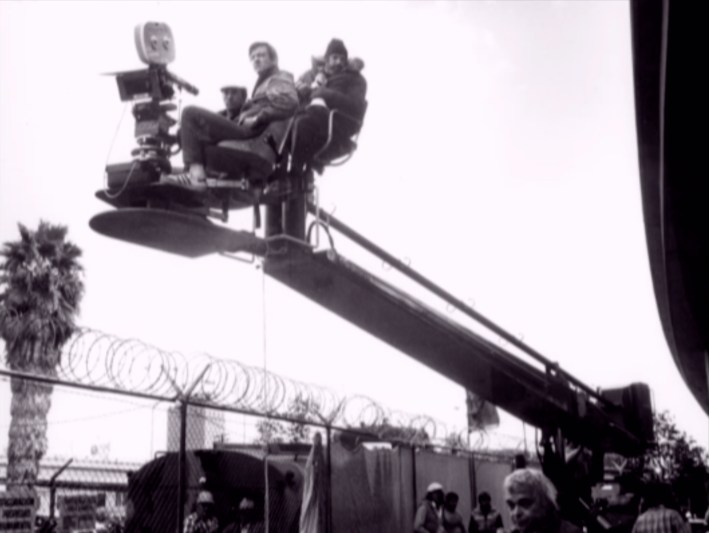
Aside from the film’s pressure-cooker car-bomb-gone-awry sequence filmed in New York, and the exterior of Tony’s Miami compound and Alejandro Sosa’s Bolivian estate, which were both shot in Santa Barbara, much of the nearly three-hour film was shot between practical L.A. locations and sets built on-stage at Universal Studios.
Stroller gives a lot of the credit to Scarface’s visual consultant, Ferdinando Scarfiotti, for capturing the look of Miami in L.A.
“He went back to L.A. and scouted all the places and he came up with some wonderful locations,” says Stroller. “He was very inventive.”
Unfortunately, 40 years later there aren’t many folks from the production who can comment with first-hand knowledge on the film’s locations, even Stroller.
“It was a few days ago,” he quips.
De Palma could not be reached for comment for this article.
Scarfiotti, producer Martin Bregman, art director Edward Richardson, cinematographer John Alonzo, and location manager Frank Pierson, who may have had some insight on the film’s locations, have since passed away.
One location manager who worked on the Florida locales declined to comment on the move from Miami to L.A.
Co-producer Peter Saphier told us he wasn’t close enough to the actual filming - he mainly dealt with Bregman, Stroller, and Universal executives - to say why and how the L.A. locations were chosen.
With all that in mind, L.A. TACO took a photographic look at a number of the L.A. spots from one of the most polarizing yet hugely influential gangster pictures ever made.
Freedomtown
Upon his arrival in the United States, Tony is sent to Freedomtown, a federally controlled refugee camp and tent city, while awaiting entrance into the country. There, Tony kills Emilio Rebenga (Roberto Contreras), an exiled Cuban official, at the behest of Miami drug boss Frank Lopez (Robert Loggia). In exchange, Tony and his trusted associates Manny (Steven Bauer) and Angel (Pepe Serna) are released and given green cards.
The actual refugee camp was located under Interstate 95 in downtown Miami. Upon moving to L.A., the production found a suitable double under the 110/10 interchange in Downtown Los Angeles.
Today, the location is an overflow lot for Lithia Motors’ DTLA Auto Group.
644 W 17th St., DTLA (approximate address)
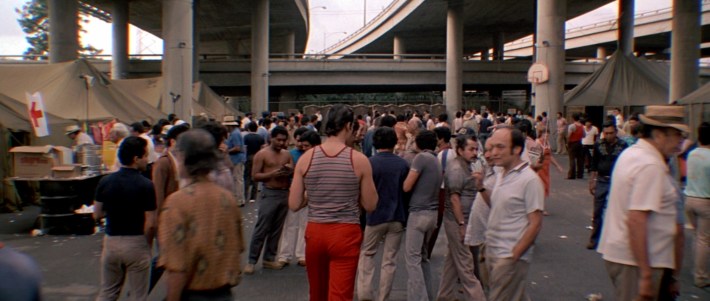
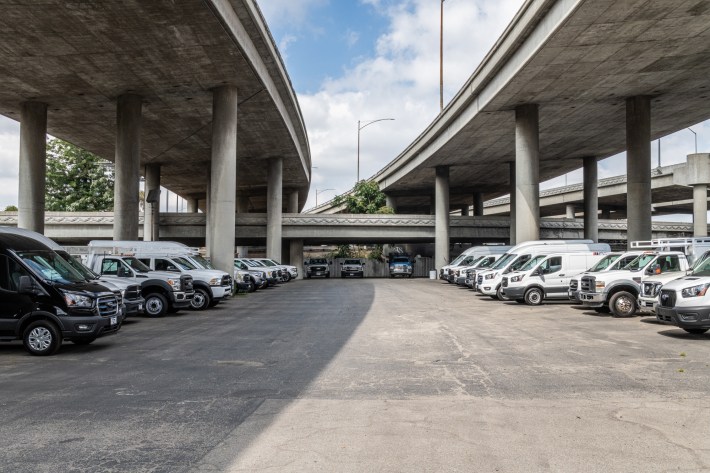
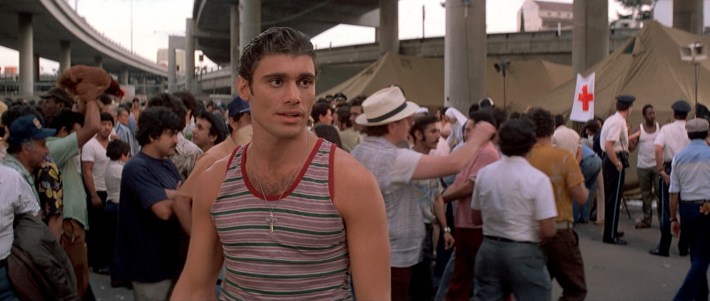
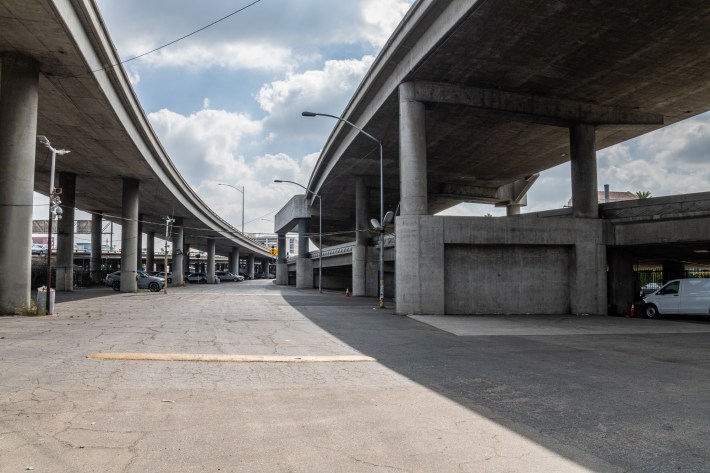
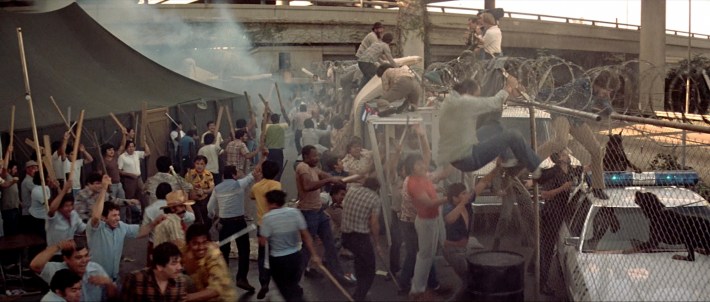
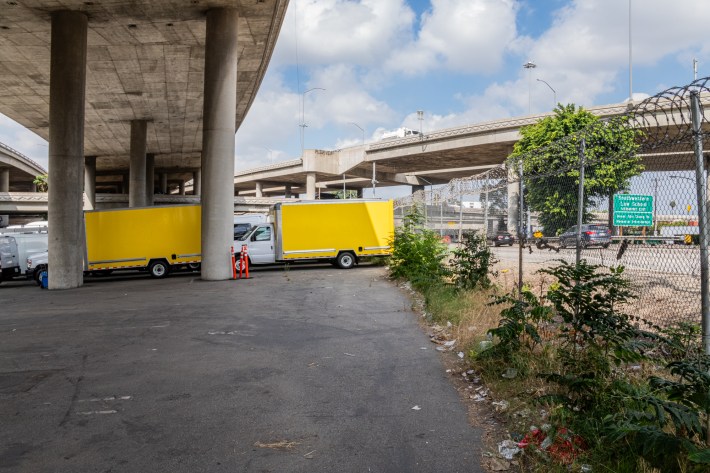
Little Havana
After Tony and Manny leave Freedomtown, they find jobs working at El Paraiso, a Cuban food stand in Miami’s Little Havana neighborhood. Manny works the counter while Tony washes dishes. Successful men in luxurious cars escort beautiful women into the Little Havana nightclub across the street. It’s here that Tony makes enemies with Frank Lopez’s right-hand man, Omar Suárez (F. Murray Abraham).
Previous accounts have placed the location on 2nd Street, near the corner of Central Avenue in Little Tokyo, but the entire block was later replaced with a contemporary apartment building.
Even the 1931 Brunswig Square office building, which can be seen as the Little Havana nightclub, has similar attributes, but looks quite different from how it appears in the film.
But there’s one concrete tie that can be made between the film and the address.
Upon viewing Scarface, an auto shop called George’s Garage can be glimpsed in the background of a wide shot that looks down the street. A 1973 Los Angeles phone book shows a George’s Garage as having been located at 377 E 2nd Street, which would have been just off the corner of Central Avenue.
375 E. 2nd St. DTLA
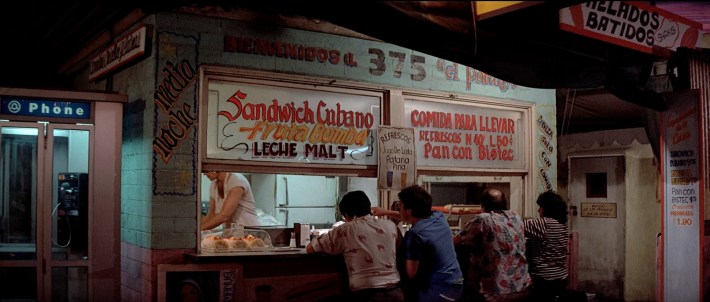
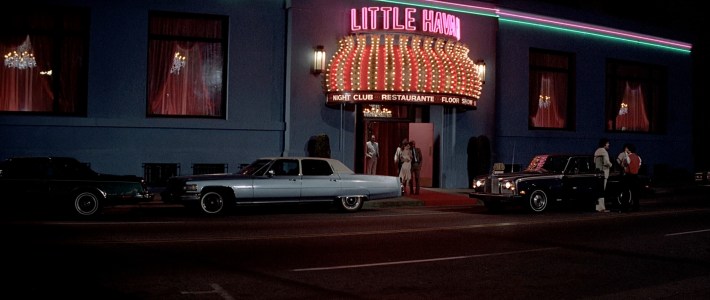
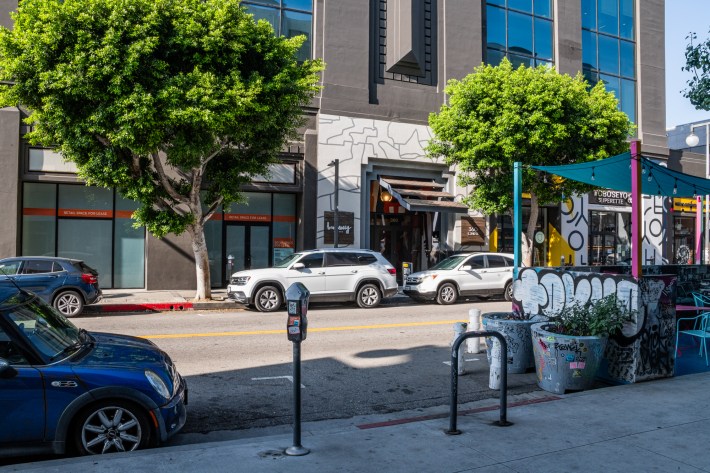
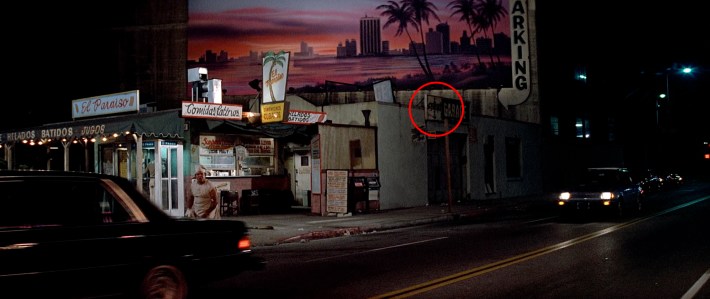
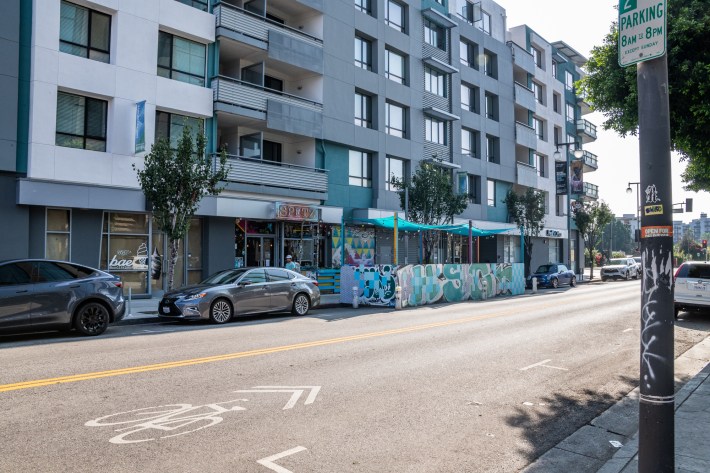
The Porsche Boutique
Having proven himself after the film’s infamous motel scene - shot between a practical exterior in South Beach, Miami, and an interior set built at Universal Studios- Tony finally has a little bit of clout and some money in his pocket.
Transfixed on having Frank’s glamorous girlfriend, Elvira (Michelle Pfeiffer), for his own, he tries to impress her by purchasing a new Porsche after she says that his yellow, 1963 Cadillac Series 62 convertible lined in faux tiger fur “looks like somebody’s nightmare.”
As Tony escorts Elvira back to the Cadillac in the dealership’s parking lot, De Palma employs a dolly zoom shot, making the world around the two of them disappear.
The featured Spanish Colonial Revival building originally opened in the 1920s as a drive-in market called the Clock Market. At the time of filming, it was Beverly Hills Porsche-Audi. Today the location is a Bentley and Lamborghini dealership.
8423 Wilshire Blvd. Beverly Hills
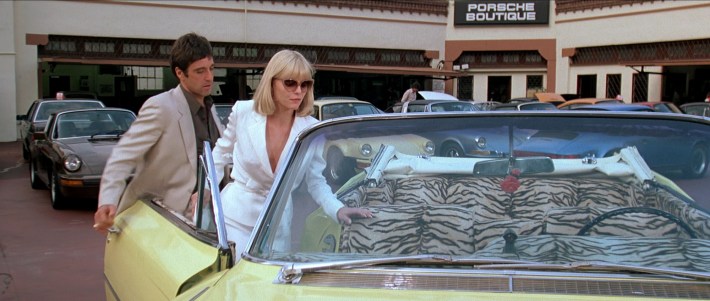
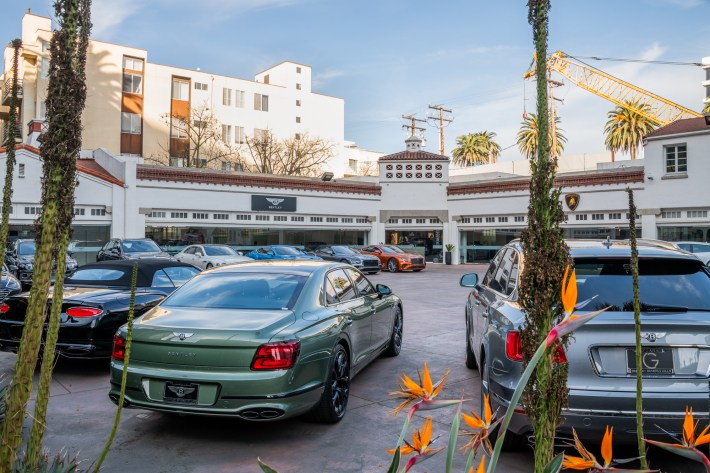
Mama and Gina’s House
Tony’s hard-working mama (Miriam Colon) and nineteen-year-old sister, Gina (Mary Elizabeth Mastrantonio) live in Miami in a bungalow home on the outskirts of an oil refinery. All too familiar with Tony’s criminal past, his mama wants nothing to do with him, and, more importantly, she doesn’t want Tony influencing Gina.
The small house was located in Wilmington, California, outside of what is today the Phillips 66 refinery. By some accounts the house was demolished. But a closer look at Google Maps shows that the house may still be standing on the property of CertainTeed, a residential construction supply company.
Though we reached out to CertainTeed multiple times, we could not gain access to the property.
1433 W E St. Wilmington, CA
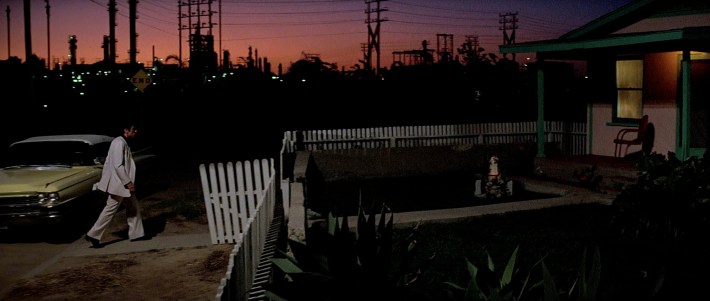
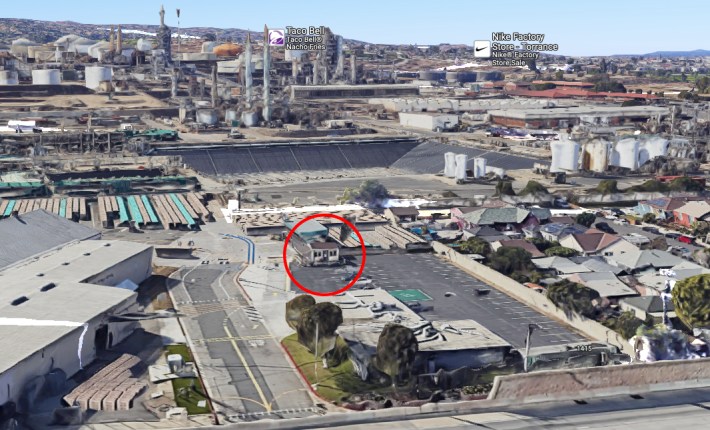
Lopez Motors
Frank owns and runs Lopez Motors, a Mercedes-Benz dealership, as a legitimate front business. The location is just a few-minutes car ride from the aforementioned Porsche dealership location.
Stroller believes that the office interior, with its iconic tropical sunset wallpaper (of which you can purchase replicas online), was built as a set on-stage.
Today, the high-end, luxury car dealership Marshall Goldman occupies the space.
8825 Wilshire Blvd. Beverly Hills
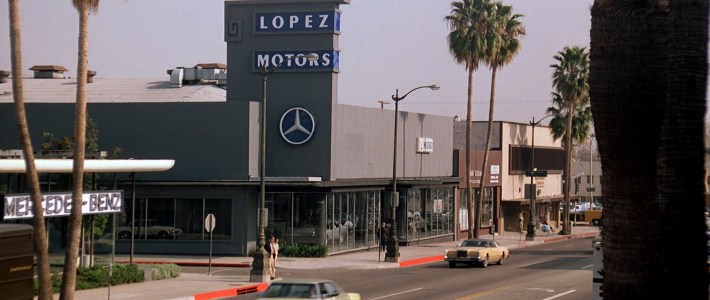
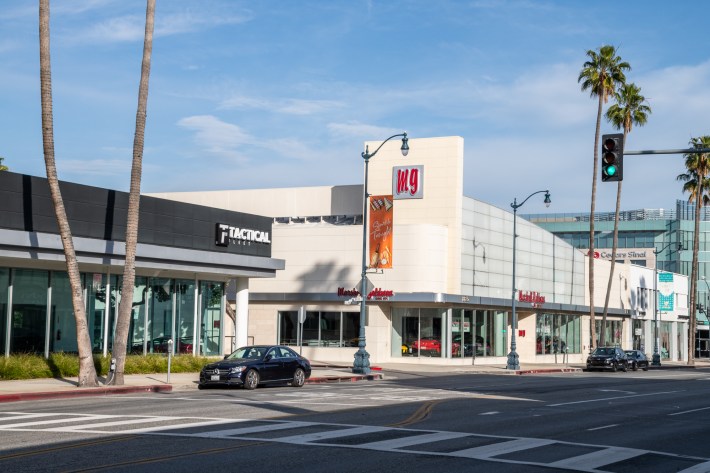
“Push It to the Limit” Montage
With Frank out of the way, Tony’s profitable partnership with Bolivian drug lord Alejandro Sosa soars to new heights.
Set to the power-pop song “Scarface (Push It to the Limit),” performed by Paul Engemann, De Palma’s “success” montage easily rivals others of the era, like the opening of Rocky III (1982) set to “Eye of the Tiger,” or the All-Valley Karate Championship from The Karate Kid (1984), set to “You’re the Best.”
The montage’s L.A. locations spanned various areas between West Hollywood and the Valley.
Tony first arrives at Tri-American City Bank with his crew. In one continuous shot, they pull out multiple canvas duffle bags filled with cash from the back of a blue Ford cargo van. They proceed into the bank, and Tony happily shakes hands with a bank executive. The scene was shot on Ventura Boulevard in Encino at a glass office building that is still listed as a usable filming location.
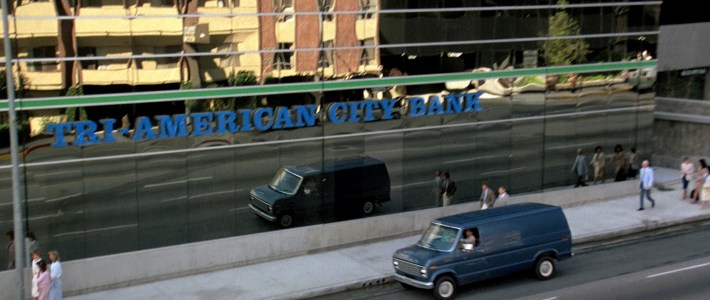
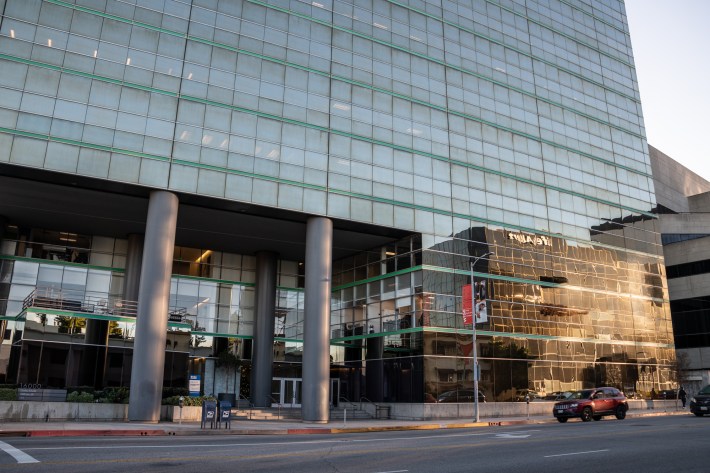
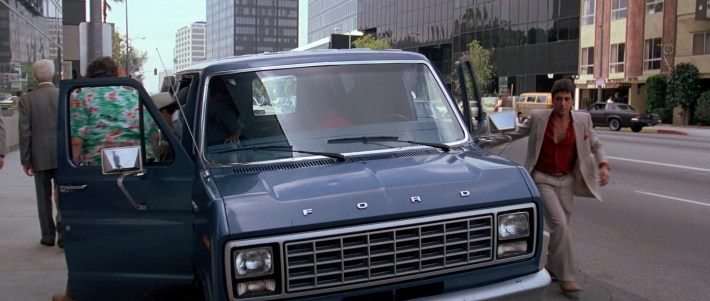
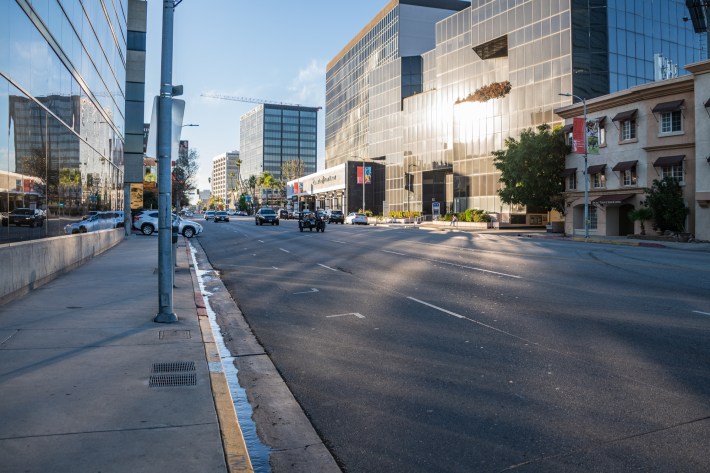
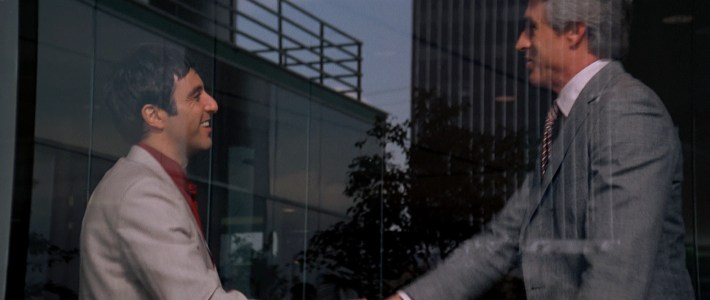
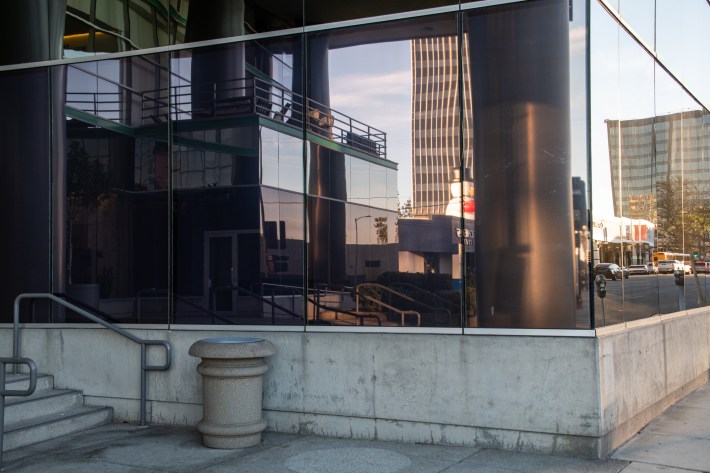
Tony, surrounded by his men, walks out of a Greek Revival building that’s home to the Montana Management Co. The address on the building, 9401 Brickell Avenue, puts the business in downtown Miami, when it’s actually part of Sunset Plaza in West Hollywood.
Based on the Montana Travel Co. address, 4569 Flager Avenue, it would be located in the Flagami neighborhood of Miami, when it’s really just a hop, skip and a jump across the street from the Montana Management Co. location.
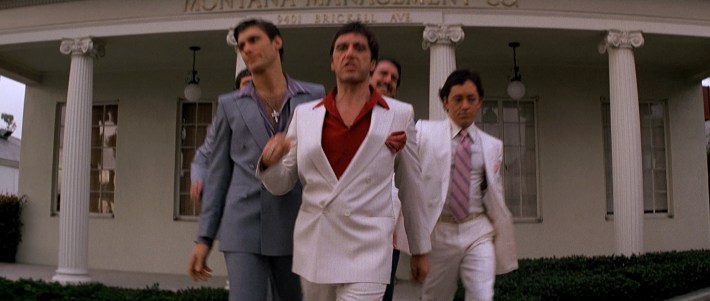
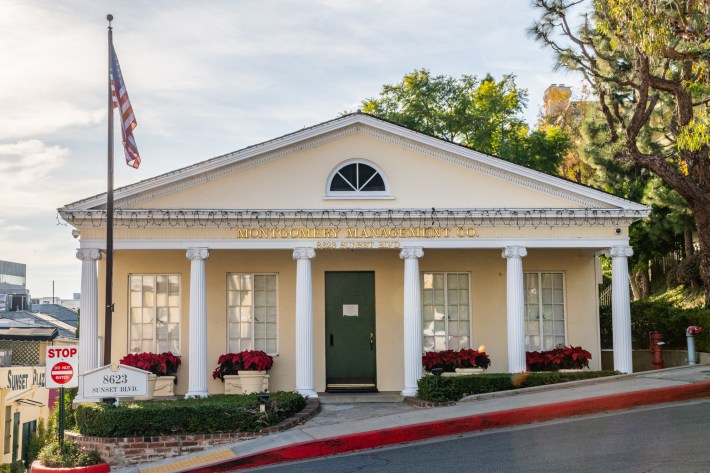
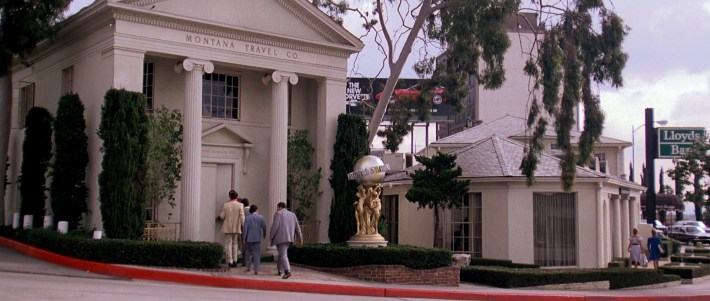
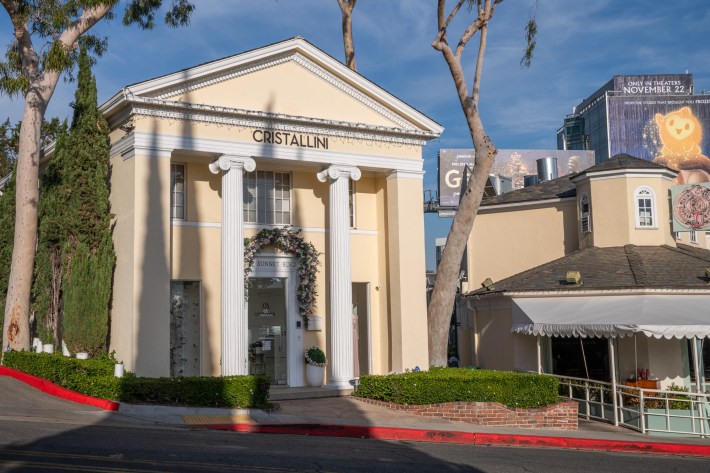
De Palma keeps his lens trained on the other side of Sunset Boulevard as Gina cuts the ribbon for the grand opening of her new beauty salon.
And in one final montage moment, Tony watches Gina try on a cream-colored satin dress in an upscale boutique. A glimpse of the address in a mirror places the store a few doors down from Gina’s salon. In the early ‘80s, the location was the shop of Diana Venegas, the Paraguay-born designer and former Miss Latin America known for her contemporary, one-of-a-kind Victorian-inspired dresses. Some of the designer’s work can be seen in the background of the scene.
Tri-American City Bank 16000 Ventura Blvd, Encino; Montana Management Co. 8623 Sunset Blvd, West Hollywood; Montana Travel Co. 8619 Sunset Blvd, West Hollywood; Gina Montana’s Beauty Salon 8440-8448 Sunset Blvd, West Hollywood; Dress Shop 8704 Sunset Blvd, West Hollywood
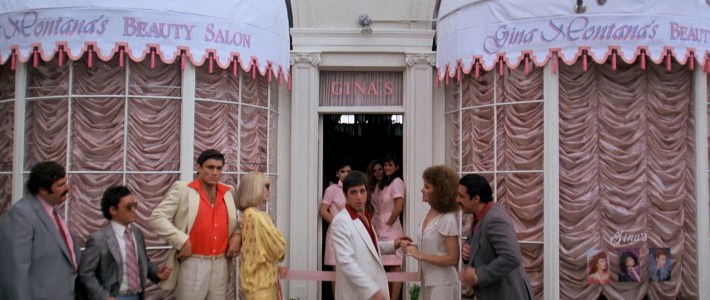
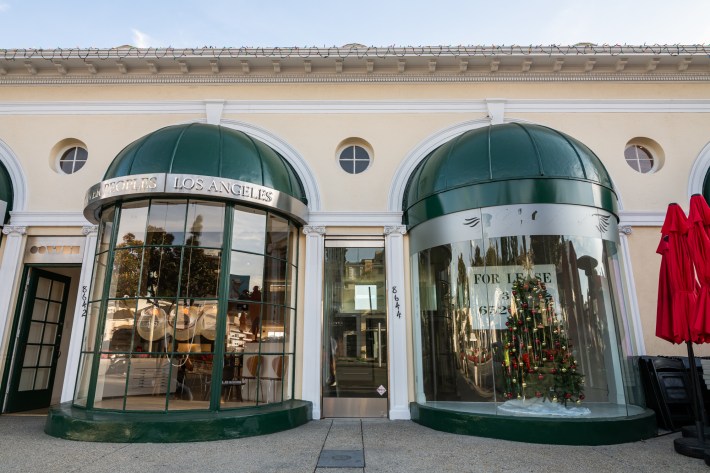
“Say Goodnight to the Bad Guy”
Drunk and stoned, Tony makes a case in a restaurant full of rich Miami socialites and business professionals that he’s the only one in the room brave enough to let his dirty laundry air out in the open.
The scene was filmed inside Perino’s, the classic Hollywood restaurant-to-the-stars.
The former supermarket building was redesigned by famed Los Angeles-born architect Paul Williams, where Perino’s relocated from a building a couple blocks down in 1950.
It remained a popular filming location even after it closed in 1986, but the building was eventually demolished in 2005.
4101 Wilshire Blvd, Greater Wilshire
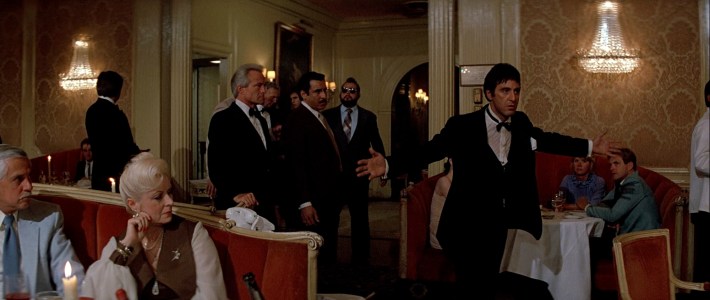
“Say goodnight to the bad guy.”
Screenshot via Universal Pictures
The Rendezvous House
While in New York, Tony learns that Manny and Gina are nowhere to be found. Upon his return to Miami, Tony’s Mama tells him about a house, where she had previously followed Gina to.
Supposedly located in the affluent Miami neighborhood of Coconut Grove, Tony’s Bentley pulls up to a house adorned with Doric columns and Greek statues. There, Tony discovers that Gina and Manny have been seeing each other behind his back.
The overly protective and obsessive Tony shoots Manny, killing him, before he learns that his sister and his most trusted confidant had just been married.
The Zillow listing for the 1975 home built on Mt. Olympus points out the property’s tie to the film.
2271 Hercules Dr. Mt. Olympus
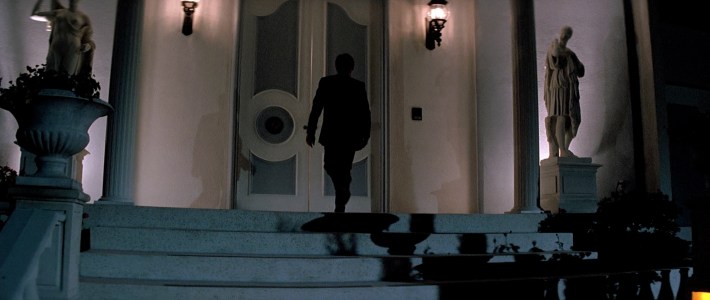
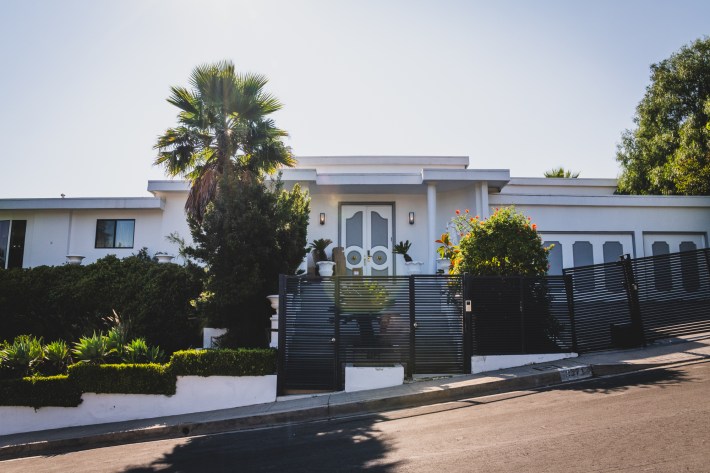
Hercules Dr. Mt. Olympus
Photo by Jared Cowan for L.A. Taco
Some of these locations are on private property. Please do not trespass or disturb the owners.
